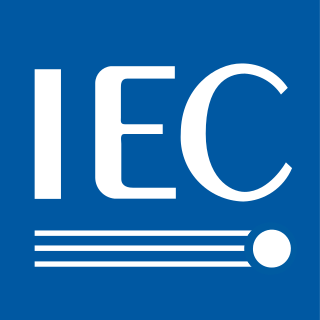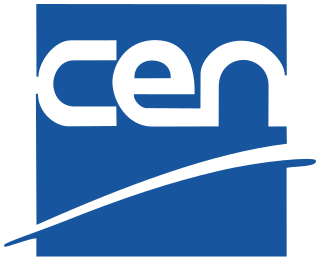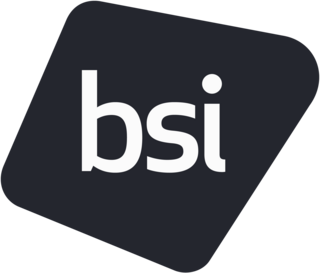
The International Organization for Standardization is an independent, non-governmental, international standard development organization composed of representatives from the national standards organizations of member countries. Membership requirements are given in Article 3 of the ISO Statutes.

The International Electrotechnical Commission is an international standards organization that prepares and publishes international standards for all electrical, electronic and related technologies – collectively known as "electrotechnology". IEC standards cover a vast range of technologies from power generation, transmission and distribution to home appliances and office equipment, semiconductors, fibre optics, batteries, solar energy, nanotechnology and marine energy as well as many others. The IEC also manages four global conformity assessment systems that certify whether equipment, system or components conform to its international standards.
Standardization or standardisation is the process of implementing and developing technical standards based on the consensus of different parties that include firms, users, interest groups, standards organizations and governments. Standardization can help maximize compatibility, interoperability, safety, repeatability, or quality. It can also facilitate a normalization of formerly custom processes.

CENELEC is responsible for European standardization in the area of electrical engineering. Together with ETSI (telecommunications) and CEN, it forms the European system for technical standardization. Standards harmonised by these agencies are regularly adopted in many countries outside Europe which follow European technical standards. Although CENELEC works closely with the European Union, it is not an EU institution. Nevertheless, its standards are "EN" EU standards, thanks to EU Regulation 1025/2012.
A standards organization, standards body, standards developing organization (SDO), or standards setting organization (SSO) is an organization whose primary function is developing, coordinating, promulgating, revising, amending, reissuing, interpreting, or otherwise contributing to the usefulness of technical standards to those who employ them. Such an organization works to create uniformity across producers, consumers, government agencies, and other relevant parties regarding terminology, product specifications, protocols, and more. Its goals could include ensuring that Company A's external hard drive works on Company B's computer, an individual's blood pressure measures the same with Company C's sphygmomanometer as it does with Company D's, or that all shirts that should not be ironed have the same icon on the label.

The European Committee for Standardization is a public standards organization whose mission is to foster the economy of the European Single Market and the wider European continent in global trading, the welfare of European citizens and the environment by providing an efficient infrastructure to interested parties for the development, maintenance and distribution of coherent sets of standards and specifications.

ANEC, formally The European consumer voice in standardisation, is an organisation promoting and defending the collective European consumer interest in the process of standardization, and in related fields such as conformity assessment (e.g.certification), market surveillance and enforcement. ANEC also aims to influence legislation that makes reference to standards or standardization. In November 2008, ANEC adopted the strapline 'Raising Standards for Consumers' as part of an initiative to improve the visibility of the association. On 15 March 2018, World Consumer Rights' Day, ANEC launched a short video to explain its role and highlight some of its successes.
European Standards, sometimes called Euronorm, are technical standards which have been ratified by one of the three European Standards Organizations (ESO): European Committee for Standardization (CEN), European Committee for Electrotechnical Standardization (CENELEC), or European Telecommunications Standards Institute (ETSI). All ENs are designed and created by all standards organizations and interested parties through a transparent, open, and consensual process.

The British Standards Institution (BSI) is the national standards body of the United Kingdom. BSI produces technical standards on a wide range of products and services and also supplies certification and standards-related services to businesses.

The Keymark is a voluntary European certification mark demonstrating compliance with the European Standard (EN). It is owned by CEN, the European Committee for Standardization, and CENELEC, the European Committee for Electrotechnical Standardization.
CEN/CENELEC Guide 6: Guidelines for standards developers to address the needs of older persons and persons with disabilities is a document for participants in standardisation activities at CEN and CENELEC that contains guidance for the creation and the revision of standards to ensure greater accessibility of products and services. The document is a "Guide", in other words, not a European Standard (EN). The guide is identical to ISO/IEC Guide 71 and was adopted by both the CEN Technical Board and the CENELEC Technical Board, and published in January 2002. The adoption of CEN/CENELEC Guide 6 resulted from a European mandate to the European standardisation organisations, and the European Commission is funding projects to promote the use of the Guide.
ISO/IEC JTC 1/SC 27 Information security, cybersecurity and privacy protection is a standardization subcommittee of the Joint Technical Committee ISO/IEC JTC 1 of the International Organization for Standardization (ISO) and the International Electrotechnical Commission (IEC). ISO/IEC JTC 1/SC 27 develops International Standards, Technical Reports, and Technical Specifications within the field of information security. Standardization activity by this subcommittee includes general methods, management system requirements, techniques and guidelines to address information security, cybersecurity and privacy. Drafts of International Standards by ISO/IEC JTC 1 or any of its subcommittees are sent out to participating national standardization bodies for ballot, comments and contributions. Publication as an ISO/IEC International Standard requires approval by a minimum of 75% of the national bodies casting a vote. The international secretariat of ISO/IEC JTC 1/SC 27 is the Deutsches Institut für Normung (DIN) located in Germany.
ISO/IEC JTC 1/SC 39 Sustainability for and by Information Technology is a standardization subcommittee of the Joint Technical Committee ISO/IEC JTC 1 of the International Organization for Standardization (ISO) and the International Electrotechnical Commission (IEC), that develops and facilitates standards within the field of sustainability and resource efficiency through Information Technology. The international secretariat of ISO/IEC JTC 1/SC 39 is the American National Standards Institute (ANSI), located in the United States.
ISO/IEC JTC 1/SC 7 Software and systems engineering is a standardization subcommittee of the Joint Technical Committee ISO/IEC JTC 1 of the International Organization for Standardization (ISO) and the International Electrotechnical Commission (IEC), that develops and facilitates standards within the field of engineering of software products and systems. The international secretariat of ISO/IEC JTC 1/SC 7 is the Bureau of Indian Standards (BIS) located in India.
ISO/IEC JTC 1/SC 25 Interconnection of information technology equipment is a standardization subcommittee of the Joint Technical Committee ISO/IEC JTC 1, of the International Organization for Standardization (ISO) and the International Electrotechnical Commission (IEC), which develops and facilitates standards within the field of interconnection of information technology equipment. The international secretariat of ISO/IEC JTC 1/SC 25 is the Deutsches Institut für Normung (DIN) located in Germany.
ISO/IEC JTC 1/SC 29, entitled Coding of audio, picture, multimedia and hypermedia information, is a standardization subcommittee of the Joint Technical Committee ISO/IEC JTC 1 of the International Organization for Standardization (ISO) and the International Electrotechnical Commission (IEC). It develops and facilitates international standards, technical reports, and technical specifications within the field of audio, picture, multimedia, and hypermedia information coding. SC 29 includes the well-known JPEG and MPEG experts groups, and the standards developed by SC 29 have been recognized by nine Emmy Awards.

The Cyprus Organisation for Standardisation, or CYS, is the national standardisation body of Cyprus, whose principal activity is the production of standards and the supply of standards-related services.
ISO/IEC JTC 1/SC 31 Automatic identification and data capture techniques is a subcommittee of the International Organization for Standardization (ISO) and the International Electrotechnical Commission (IEC) Joint Technical Committee (JTC) 1, and was established in 1996. SC 31 develops and facilitates international standards, technical reports, and technical specifications in the field of automatic identification and data capture techniques. The first Plenary established three working groups (WGs): Data Carriers, Data Content, and Conformance. Subsequent Plenaries established other working groups: RFID, RTLS, Mobile Item Identification and Management, Security and File Management, and Applications.
EN 16114 "Management consultancy services" is a standard published by the European Committee for Standardization (CEN) on September 28, 2011. It focuses on the providing of management consulting services by management consultancy service providers (MCSPs).








